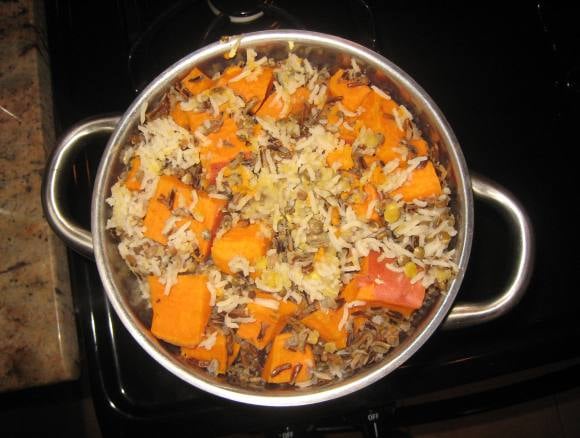According to a 2012 Gallup poll, 5% of Americans identify as vegetarian, while 2% are living a vegan lifestyle. That’s seven percent of the country’s population opting out of meat and fish, and in some cases, all animal byproducts.
Some do it for health reasons. Others, for ethical or religious reasons. Whatever the case, a vegetarian or vegan diet has its pros and cons—and the same goes for the pets whose owners choose this diet for them to follow, too.
Pros of a Vegan or Vegetarian Diet for Dogs
The good news for those of you wanting to put your dog on a vegetarian or vegan diet? It can be done. And if your dog suffers from allergies, it might be the answer to some of his suffering, too.
Behind fleas, the leading cause of skin allergies in dogs is actually food allergies—oftentimes to a meat protein such as beef, chicken, or lamb. A vegetarian or vegan diet in which meat is eliminated could clear up those problems—and other medical problems such as liver disease and kidney stones—stat. It also lowers the carbon foot—er, paw—print left behind. As long as you’re very carefully monitoring the nutrients your furry friend is taking in, in consultation with their vet, and making sure the diet is balanced, a vegetarian or vegan diet lifestyle is a possible option. That said…
Pitfalls of a Vegetarian or Vegan Diet
A vegetarian or vegan diet has its downfalls—and can even be dangerous.
Before you switch up your dog’s eating habits, consult with a veterinary nutritionist who can speak to a specialized diet, and make sure your dog visits your general vet more frequently to keep any potential problems at bay.
It may seem harmless to share a dietary lifestyle with your dog (we’re both omnivores, after all), but the reality is that humans and dogs are very different creatures with very different needs, and if they aren’t met, the consequences can be damaging—or even deadly.
Additionally, if you plan to breed your dog, a vegetarian or vegan diet is a no go—so plan ahead. If you do decide an alternative diet is the choice for your pooch, make sure you’re purchasing food with nutritional levels blessed by the American Feed Control Officials (AAFCO). And, of course, a well-intentioned vegetarian or vegan diet gets you nowhere if your dog won’t eat it (or enough of it) and winds up suffering from a lack of essential nutrients—the key, again, is close monitoring and regular check-ups.
Store-Bought vs. Homemade
The choice is yours! Dog parents who have chosen a vegetarian lifestyle for their furry friends like Natural Balance’s Vegetarian Dog Formula and PetGuard Organics Vegetarian Adult Dry Dog Food, while Halo’s Vegan Garden Medley and V-dog’s Kibble are popular vegan options.
And for those of you interested in a DIY approach? Vegan blogger Lindsay Nixon feeds her pugs a balanced bowl of beans or lentils with finely chopped raw veggies, pumpkin or squash, and brown rice. PETA offers up a peanut-buttery-delicious option with rice and quinoa, lentils, sweet potatoes, peanut butter, and nutritional supplements to fill in the gaps.

Via PETA
The Bottom Line
A vegetarian or vegan diet is possible, but requires a lot more effort on your part to ensure your dog is eating a healthy, balanced diet that leads to a healthy, balanced life. The choice isn’t one to be taken lightly, and should come with a solid understanding and reasoning behind it—but ultimately, it’s an option you can consider alongside your vet (and your dog, of course).
The information provided in this article is not a substitute for professional veterinary help.



